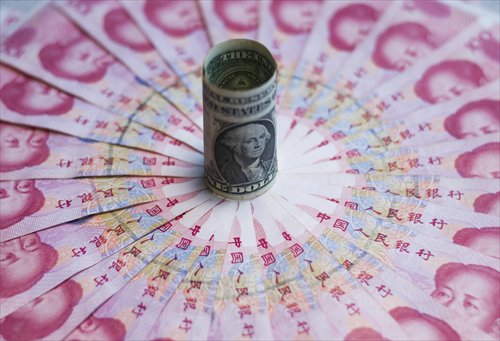FX reserves fall prompts worries
Economist sees $3 trillion as lowest acceptable level

Photo:CFP
Efforts should be made to stem capital outflows and total foreign exchange (FX) reserves should be kept at no less than $3 trillion in 2016, an economist said over the weekend, after the nation saw a record drop in FX reserves in December.
A sharp drop in FX reserves could intensify depreciation pressure on the yuan, Li Daokui, an economist at Tsinghua University, told a forum in Beijing Saturday, according to news portal finance.ifeng.com.
China's FX reserves, though still the world's largest, saw a record monthly drop of $107.9 billion in December to $3.33 trillion. For the whole of 2015, FX reserves declined $512.66 billion, the biggest annual drop on record, according to data released Thursday by the People's Bank of China (PBC), the central bank.
Capital outflows and the strengthening US dollar are major reasons behind the drop in FX reserves, said Xu Hongcai, director of the Economic Research Department at the China Center for International Economic Exchanges. The devaluation of euro-denominated reserves also contributed to the drop, he told the Global Times Sunday.
Weakening yuan
Changes in FX reserves are closely connected to the exchange rate, and the yuan's central parity rate against the dollar weakened to a near-five-year low on Thursday, before rebounding slightly on Friday.
There has been confusion in the market about China's foreign exchange policies in the past few days, as the PBC has allowed the yuan to depreciate at a faster pace by lowering the central parity rate against the dollar, recent media reports said.
"The authorities should send out clear signals about their foreign exchange policies, as that can boost market confidence," Xu noted, adding that this is important at the moment to stabilize the exchange rate.
But Xu said the authorities do not have to stick to the $3 trillion FX amount, and if the yuan weakens further, the authorities will have to sell dollars and buy yuan to support the country's currency.
Though the yuan may continue to depreciate against the dollar, the exchange rate against a basket of other currencies should remain stable, Li said at the forum.
China has recently adopted measures to loosen the yuan's peg to the dollar. On December 11, China set up a new yuan index measured against 13 currencies, including the dollar, euro and Japanese yen. The central bank said in a statement in December that the yuan's performance shouldn't be measured against the dollar alone.
Risks 'controllable'
"The yuan's exchange rate could remain stable against the basket of currencies in 2016, or even rise moderately," Xu said. But he also forecast that the yuan would depreciate by 3-5 percent against the dollar in 2016.
The yuan is expected to reach 6.90 per dollar by the end of the year, which would be a depreciation of around 5 percent compared with the current rate, Barclays said in a research note sent to the Global Times Saturday.
The US Federal Reserve is scheduled to hold a meeting to discuss interest rates on January 26-27. Though Xu noted that China's FX reserves may further drop as the dollar strengthens in 2016, the risk is controllable, as is the risk relating to depreciation pressure, he said.
"The basis of the economic recovery in the US is still very fragile," Xu said, noting that interest rate hikes in the US will be moderate this year and that the impact of interest rate rises on the dollar's value may have been exaggerated.
In a statement on Saturday, the State Administration of Foreign Exchange also said that China's foreign exchange reserves are "relatively abundant" despite the record drop in December. It also said that the fundamentals of the economy are sound and that "China's financial system is stable and healthy."